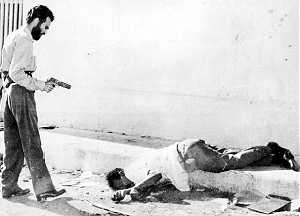[ADN Kronos] Pakistani investigators have found substantial evidence directly connecting the militant group Lashkar-e-Toiba (LeT) to last year's Mumbai terrorist attacks which killed 166 people and injured 300 others, said an official report published on Wednesday.
The findings provided the basis for the trial which started last week of five arrested LeT operatives by an anti-terrorism court inside Rawalpindi's Adiala jail.
"The investigation has established beyond any reasonable doubt that the defunct LeT activists conspired, abetted, planned, financed and established communication network to carry out terror attacks in Mumbai," said the report.
It is the first time that Pakistanis are being tried inside the country for carrying out terrorist attacks on foreign soil.
Political and security analysts in the capital Islamabad said the serious nature of investigation into LeT's involvement and the trial indicated Pakistan's determination and commitment not to allow its territory to be used for planning and launching terrorist attacks.
An updated report on Pakistani investigation handed over to India on 11 July said the material recovered from LeT camps in Karachi and the coastal town of Thatta indicated that the terrorists were provided training and weapons by the militant outfit.
The investigation gives some new and startling details about people involved in training and providing finances for the worst terrorist attack in India which heightened tensions between the two South Asian nations.
The LeT, which is the most powerful Pakistan-based Jihadi group, was outlawed in 2002, but it continued to operate in Kashmir.
Western intelligence agencies maintain it continued its activities in Pakistan under the banner of Jamaatud Dawa, the charity wing of the group which also was declared a terrorist outfit by the United Nations Security Council earlier this year.
Pakistan has already arrested and charged five LeT commanders including Zakiur Rehman Lakhvi and Zarar Shah with planning and facilitating the bloody assault.
The other three accused are Hammad Amin Sadiq, Mazhar Iqbal alias Al Qama and Shahid Jamil Riaz, all activists of LeT.
Ajmal Amir Qasab, the sole surviving gunman of the Mumbai attack who is now in Indian custody, in his statement named Lakhvi, Zarar Shah and some other LeT commanders for training and launching the terrorists.
Qasab who came from the town of Faridkot in Pakistan's Punjab, was among 10 terrorists who carried out the attacks. The other nine killed during the attacks also belonged to Punjab which is the main stronghold of LeT.
The accused were taken on Saturday before a makeshift anti-terrorism court in the high-security Adiala jail in Rawalpindi.
"There are sufficient oral, direct documentary, circumstantial and scientific evidence which directly connect the accused with the commission of the offence," said the charge-sheet.
Lakhvi, Zarar Shah and Mazhar Iqbal (also known as 'Al Qama') have also been charged with planning, preparation and execution of the attacks and operational handling of the 10 terrorists.
Lakhvi, the top commander of the LeT who was arrested on 18 February, is a resident of Rinala Khurd in the district of Okara. He is named as the mastermind of the entire Mumbai massacre operation.
Investigators here said they had recovered handwritten diaries, training manuals, Indian maps and operational instructions from the LeT camps.
"The accused were running training camps for terrorists, providing sea and navigational training, conducting intelligence courses and directions for terrorist attack," the report said.
According to the new details, training sessions, codenamed 'Azizabad', were held in an LeT camp in the Pakistani city of Karachi from where the investigators seized militant literature, inflatable lifeboats, detailed maps of the Indian coastline, handwritten literature on navigational training and manual of an intelligence course.
Another training camp in Thatta was housed in five thatched rooms about two kilometres from a creek from where small boats sail to the sea. The terrorists also received training in this camp.
The investigators seized pocket diaries containing names of the accused and other persons and details of expenditure of the camp.
Pakistan has asked Indian authorities to provide more information about Faheem Ansari and Sabauddin Ahmed, the Indian nationals suspected to be involved in facilitating the attack.
Both are in custody and the Indian authorities had earlier denied that any of their nationals was involved in the attacks.
During investigations, the two had confessed to visiting Lahore, Rawalpindi, Muridke, Karachi and Muzaffarabad. They were also believed to be in contact with the five accused.
|
 Mohammad Ajmal Amir Qasab, the sole surviving gunman from the 2008 Mumbai attacks, has been hanged.
Mohammad Ajmal Amir Qasab, the sole surviving gunman from the 2008 Mumbai attacks, has been hanged.
 Pakistan has freed all arrested leaders of the
Pakistan has freed all arrested leaders of the  An Indian minister claims Pakistan's "official agencies" were behind the last year's terror attacks on the port city of Mumbai. "Given the overwhelming evidence we have, I am entitled to presume that official agencies (of Pakistan) were involved," Home Affairs Minister Palaniappan Chidambaram said in an interview to be aired Sunday. He, however, did not elaborate on the evidence.
An Indian minister claims Pakistan's "official agencies" were behind the last year's terror attacks on the port city of Mumbai. "Given the overwhelming evidence we have, I am entitled to presume that official agencies (of Pakistan) were involved," Home Affairs Minister Palaniappan Chidambaram said in an interview to be aired Sunday. He, however, did not elaborate on the evidence.  Pakistani President Asif Ali Zardari sacks the country's deputy Attorney General and Special Public Prosecutor Sardar Mohammad Ghazi. The decisions were made nearly two weeks after the senior official sparked controversy by claiming that Islamabad had formally requested India to hand over
Pakistani President Asif Ali Zardari sacks the country's deputy Attorney General and Special Public Prosecutor Sardar Mohammad Ghazi. The decisions were made nearly two weeks after the senior official sparked controversy by claiming that Islamabad had formally requested India to hand over